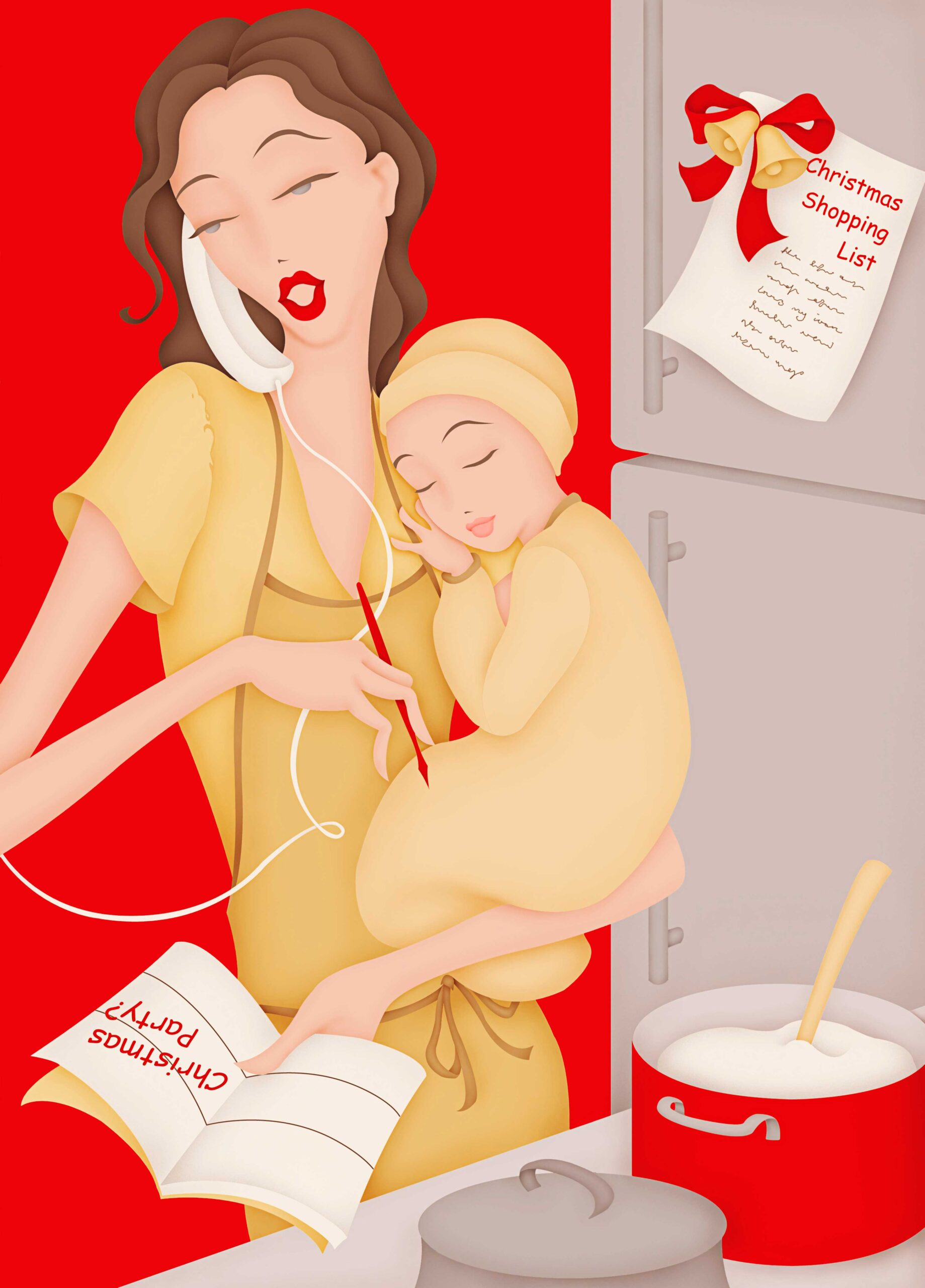One of the ironies of December is that feelings of festivity are few and far between. And as for peace, joy and goodwill to all – whoever wrote those carols has clearly never spent Christmas Eve fighting for a space in a Westfield car park.
It’s not totally unexpected that Christmas features on the internationally recognised Holmes and Rahe Stress Scale. The psychological tool identifies it alongside death and divorce as an event causing levels of stress that can lead to illness. But why has a merry Christmas becomes less a given and more a remote possibility?
Experts and statistics alike suggest our frenetic pace of life has to take a large part of the blame. The recent NEXT Report of more than 1000 Kiwi women nationwide revealed 55 per cent of us believe we are busier than we’ve ever been – and that’s year round.
Throw into the mix Christmas deadlines, multiple gift-buying expeditions, a dozen drinks parties, the school play, a Surf Life Saving fundraiser and the organisation of a giant family get-together, and it’s no wonder 60 per cent of us say there are not enough hours in the day.
Life coach and motivational speaker Sarah Laurie warns our packed lifestyles are not likely to mellow anytime soon – “that’s just the way and pace of our world” – but she believes what we can improve is the way we cope with it.
“We have to recognise that the solution to feeling in control of things is to feel in control of ourselves,” she says.
Time management expert Robyn Pearce agrees. “It’s not about not being busy,” she suggests, adding that by their nature, proactive people are busy regardless.
“But it’s making sure we carve out time for ourselves.”
Which all sounds well and good, but how do you do that when you’re facing a seemingly insurmount-able mass of jobs, especially in the silly season? Both women agree planning is everything.
“It’s about momentarily stepping off the treadmill and listing everything that needs to get done,” says Sarah, author of several books including From Tired to Inspired.
“We try to jam everything into this precious time of ours – as if time were the malleable part. But we need to stop, turn our attention to it, and think about how we manage it.
“There is a quote that says for every minute spent planning, you save 10 minutes in execution; so just 10 minutes organising ourselves can give us back more than an hour and a half in a day.”
Creating a to-do list helps identify what’s important and what can be dealt with later.
“As women we’re very good at getting confused between our priorities and our pressing responsibilities,” says Sarah. “And when we aren’t clear on what differentiates those we try and do it all.”

When it comes to establishing priorities, there’s no doubt that for mothers, children come top of the list. Indeed, the NEXT Report revealed 90 per cent agree with the statement: ‘When my kids tell me they love me, it makes everything worthwhile’.
So it’s perhaps to be expected that trying to juggle everything so we can be at prizegiving and the kindy Christmas party while meeting work deadlines is one of December’s biggest stressors for work-ing parents. And then there’s the dilemma of what to do with the kids over the endless summer holidays.
Is it any surprise almost three-quarters of working mums NEXT polled feel guilty when their children need them and they are at work? Perhaps because of this, 41 per cent of those women admit they’d rather be a full-time mum than working.
While understanding the sentiment, Robyn says guilt is an unhelpful emotion, and suggests instead parents focus on what time they can give.
“Children have to learn they can’t have you 100 per cent of the time; sometimes you’re going to miss things, but as long you’re there for others, they understand,” says the mother-of-six, who advises getting your little ones to put their events on the family calendar.
“And when you have a block of time you’re dedicating to the children, the key is your focus. You’ve got to be quite strict about it and not let the technology distractions filter in, so you’re not diluting that time with iGuilt and work guilt.”
Robyn believes our reliance on devices is a key culprit in our feelings of unbalance.
NEXT’s survey shows almost three-quarters of us have a smartphone – and with it the ability to constantly be online. The multi-tasking which follows – playing with the kids while replying to your boss’s email and texting your mum – is not just exhausting; it’s ineffective. Research shows that, neurologically speaking, multi-tasking is impossible.
“We can certainly juggle things, but nobody can actually hold two complex ideas in the brain at the same time,” says Robyn.
And skipping from task to task while being interrupted by texts or alerts gobbles up huge amounts of time.
“When you’ve had an interruption, it takes 10-20 times the length of the interruption to get back into what you were doing,” continues Robyn, whose solution is to turn off notifications, and instead dedicate a block of time to check them.
“So a 30-second interruption could take you 5-10 minutes to get back into the task you were doing before.”
It’s ironic that technology which is meant to make life easier has, in many ways, created more work.
“We live in this world of conveniences, but there is this constant dichotomy that the more stuff you have, the more time you’re inclined to spend time looking after that stuff,” says Robyn.

Those with the ability to purchase ‘stuff’ often feel a certain responsibility to give back – with the NEXT Report showing 53 per cent of us are involved in unpaid work outside the home. But with many organisations ramping up their fundraisers at this time of year, and most clubs and groups having events to organise in December, this adds to the Christmas pressure.
Sarah says managing this comes back to being clear on our priorities, which in turn allows us to evaluate what we have time for.
“Then when someone rings asking us to do the charity collection we can say, ‘I’m sorry, I’ve committed to these things, but I’d love to help you in the new year.’”
That goes for any event to squeeze in between now and December 25.
“It seems human nature to cram everything in before Christmas, but there is going to be another week after Christmas, and another after that,” says Robyn, author of Getting a Grip on Parenting Time.
Women are notoriously bad at saying no, but Robyn says the ability to turn something down is a powerful time management tool. Sarah agrees. “We need to learn to say ‘yes’ to us – which means saying no to other things,” says the mum-of-four.
And don’t be afraid to ask for help. The NEXT Report shows 27 per cent of women are resentful about the amount of domestic chores they have to do – which can feel even more overwhelming alongside the demands of Christmas. But how many of us get the family to do their share?
“We have got so efficient at doing things, we think we might as well do them ourselves rather than waste more time trying to explain them,” says Sarah.
“But I think we need to put our hands up for help. It doesn’t have to be a negative thing; we can position it as being a bit more inclusive, for example, get the kids on board as ‘Santa’s helpers.’”
Another simple approach is to change our language. ‘Season’s greetings’ might be an anagram of ‘tense aggressions’, but there’s no need to harp on about it.
“Whatever you speak becomes your reality – so if you say, ‘Christmas is coming up and I’m going to be exhausted’, you can guarantee you will be,” says Robyn.
“But if you say to yourself and the people around you, ‘I’m going to have a relaxed time’ then you’ll change your results.”
And while you might feel you don’t have time to draw breath, Sarah’s research has led her to conclude correct breathing is key to combating the wired state many of us find ourselves in at this time.
“The correct breath should be the foundation for all productivity,” she explains, adding that throughout each day we should aim to pause every 90 minutes and breathe deeply into our stomachs for 60 seconds.
“When we’re breathing correctly we’re better equipped to problem-solve, decision-make, stay at ease and manage our emotions.”
And if we can do that, perhaps we’ll rediscover the charm that lies within Christmas – and concede it is the most wonderful time of the year.
Robyn’s tips for an organised Christmas
1 Simplify. Instead of saying ‘What else can I fit in?’ ask yourself, ‘What else can I cut back?’
2 Get everybody to muck in with the food. Scale it back; you don’t need to do an over-the-top Christmas dinner.
3 Don’t feel you need to buy presents for everybody. And for those you do buy for, consider experiences or vouchers, so it’s not an enormous, expensive and time-exhausting exercise.
4 Instead of organising all your social events just before Christmas, spread them throughout the year.
5 Consider your mental attitude; if you verbalise the way you want your Christmas to be, everything will follow on from that.
For more time-saving tips from Robyn, go to gettingagrip.com.


